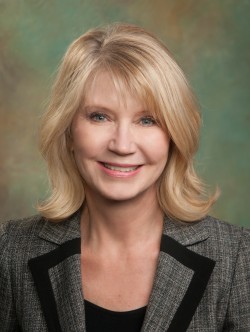News | June 22nd, 2016

When the State of North Dakota recently released the May revenue totals, it was revealed that if things continue as they’ve been going, the state’s rainy day fund of $75 million, also known as the budget stabilization fund, may be depleted by the end of the year, potentially causing the need for a special session which up until this point, Governor Jack Dalrymple has resisted calls for.
This follows the last revenue projection which saw the Governor implement across-the-board budget cuts much to the chagrin of Democrats in the Legislature, who wanted a say in those cuts. It was a stark change for a state that was flush with cash from oil revenues a little over a year ago.
So how bad is it and where do we go from here? We asked the person who had to deliver this bad news, Pam Sharp, who is Director of the State’s Office of Management and Budget.
High Plains Reader: How bleak is the financial picture for the state’s coffers? Where are we at right now?
Pam Sharp: As of the revenues we collected through the end of May, we are $90 million dollars below our revised forecast. What’s really in the mix right now and what is going to tell us what we need to do is we need to wait and see what our June numbers are, which we’ll have about the middle of July and we’re also currently working on a new revenue forecast, which is a routine revenue forecast and that will tell us what we are going to need to do after that.
So we’re $90 million dollars below compared to what we thought we were going to get with our revenues. We have $75 million dollars left over that’s still available in the budget stabilization fund and we do have some turnback that we know is going to happen and when we include that into the mix, we would have an estimated ending balance of about $5 million dollars.
So we’re on the positive side right now but if we had another month of negative revenues or we had a revenue forecast that would show that revenues are not going to improve, then we would have to take some kind of action and that action would be one of a couple things.
If our forecast shows that revenues are gonna pick up but we’re still a little bit below what we need to be to have an ending balance at the end of the biennium, that could require us to do another small allotment in addition to taking the rest of the money that’s available in the budget stabilization fund. If it’s a more significant shortfall, than the Governor would need to consider a special session.
HPR: How did this happen? How did the projections get so wrong?
PS: In the revised revenue forecast, there are two things. The price of oil went down. If you go back to the revenue forecast that we did during the Legislative session, there was no indication at that time that the price of oil would get as low as $25, $26 a barrel, the West Texas Intermediate price, that wasn’t in our sights at that time.
Also because that price of oil dropped so significantly, all the activity in western North Dakota, the drilling rigs, the fracking, all that activity dropped significantly and much more than what we thought it would have, given we didn’t think the price was going to go that low.
Now when we redid the forecast in January, the price was very low, we had to do an estimate of what we thought the number of drilling rigs would be and at that time, we thought it would go down to about 30 but it went down significantly more than that, and so then the wells and the drilling rigs were producing fewer taxable sales and purchases, less sales tax generation for the general fund.
The other thing that I think was very hard to ascertain was how much the decrease in farm commodity prices was impacting sales tax collections. I think that was a lot more significant that we thought, so it’s a combination of the price of oil and the farm commodity prices.
HPR: Is there anything that can be done with projections in the future, maybe next session, adjusting how you do them so that the projections don’t go off?
PS: We’re actually working on that right now with Moody’s. They’re working on a forecast with us. We started actually the beginning of this month. What they are trying to do is, they need to change the model again. During the ‘13-‘15 biennium, the model actually worked really very well and the projections were actually pretty good and that was with the increasing price of oil.
You have to adjust the model differently when it’s a declining price of oil, so clearly that correlation between the price of oil and the sales tax generated was missed in January. So now they are working on refining that model more and they’re actually going to work on the model and then go backwards, and see how that model works going backwards, [compared] to what actually happened, to give us more confidence going forward that the model will work. So that’s in process right now.
HPR: What would you say to someone who said, well it kind of looks to me like the Legislature spent too much and didn’t leave enough in the rainy day fund if it was possible that it might run out?
PS: Well I’d say I guess you have to ask the Legislature about that. I would get a Legislator and ask them that question.
I can tell you the way money gets into the rainy day fund or the budget stabilization fund is any money over $65 million dollars in the ending balance goes into the budget stabilization fund. However, there’s a cap on that fund saying that it cannot have any more than 9.5% of the general fund budget. That statute has been in place for awhile, and that’s the only way that money gets into the budget stabilization fund. That had increased up to the $572 million dollars that we had, going into this biennium. So that has been in place for a long time.
HPR: I know there have been calls for a special session months ago. Is that a last resort? And is that a last resort because of the drawback of the amount it would cost per day to have one? But the advantage of it is, the Legislature would be able to have some say in what gets cut and could help find ways to appropriate extra dollars to fill the shortfall.
PS: If a special session were called, there would be an opportunity, if there was another allotment required, to not do it completely across the board. One of our concerns right now is the Department of Human Services. If there was another across-the-board allotment, we know that the Department of Human Services actually would not be able to do that. The $54 million they had to cut out of their budget in the first allotment, the 4.05% allotment, was very, very difficult to do and it impacted services. Another across-the-board allotment would be very difficult for them to manage, as well as the Department of Human Services. Now, if there were just a small adjustment that needed to be done -- that is a possibility. But if it was a very large adjustment, it would be prudent for the Governor to ask the Legislature to look at it to see if should be not completely across-the-board.
HPR: To just reiterate where we are at right now, this is with an already implemented across-the-board cut that has happened at every state agency. You said a 4.05% cut that was put in place after the last budget projections showed a downturn, correct?
PS: That is correct yes.
HPR: One question I have as far as the timing, some people might be suspicious as to why this came out the day after the primary in the state, when it may have impacted some of the races, in particular for Governor. How did you decide when to put this out?
PS: Our accounting system closes on the 10th of every month, so we don’t have numbers available until the 11th of the month. Normally it takes us about until at least the 3rd week before we get all our reports run and get our newsletter ready and send it out.
In this situation, there was a Government Finance committee meeting that had been scheduled, and I don’t schedule those -- the Legislative Counsel does, scheduled on the 16th. Now, had that meeting not been scheduled, we probably would have waited until like right now today, our newsletter just went out today, that’s when the information would have gone out. However, because there was a meeting scheduled on the 16th, we reported information to that meeting on the 16th, which is a quick turnaround after we actually get our numbers.
HPR: So again, the next marking point will be mid-July and that will be where we decide where we are at and if we need to look at a special session?
PS: Right. In the middle of July, we will know what our June revenues were, and we’ll also hope to have our revenue forecast finished by then, so that a decision can be made middle of July.
HPR: The Governor’s resistance to a special session up until this point has just been cost?
PS: We still don’t know if we need to have a special session, so he won’t make that decision until the middle of July.
July 15th 2025
July 7th 2025
June 9th 2025
April 30th 2025
April 24th 2025




__293px-wide.jpg)
